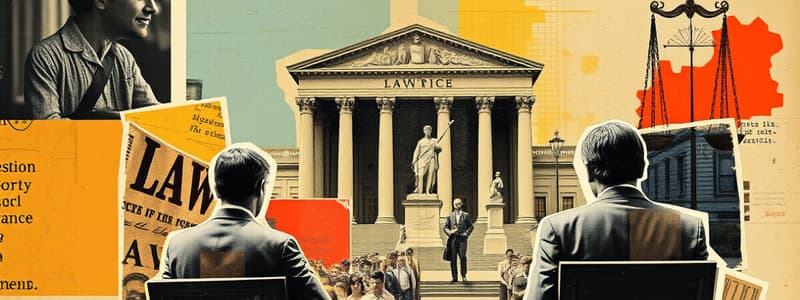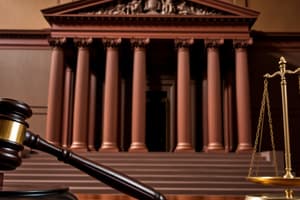Podcast
Questions and Answers
What does the Bureau of Justice Statistics primarily aim to do?
What does the Bureau of Justice Statistics primarily aim to do?
- Publish laws and codes for federal courts.
- Conduct criminal trials at the federal level.
- Enforce criminal laws across the United States.
- Collect and analyze data related to crime and justice systems. (correct)
What best describes the role of the Appellate Court?
What best describes the role of the Appellate Court?
- A court that conducts trials for criminal cases.
- A court that issues new criminal justice laws.
- A court that enforces laws and policies.
- A court that reviews decisions made by trial courts. (correct)
What is the primary distinction of the Dual Court System in the United States?
What is the primary distinction of the Dual Court System in the United States?
- It consists only of federal courts managing all criminal cases.
- It includes both state courts and federal courts. (correct)
- It does not involve appellate processes.
- It only governs civil issues, excluding criminal matters.
Which of the following accurately defines 'Due Process'?
Which of the following accurately defines 'Due Process'?
How is 'Effectiveness' defined in the context of the criminal justice system?
How is 'Effectiveness' defined in the context of the criminal justice system?
What does the term 'Common Law' refer to?
What does the term 'Common Law' refer to?
What encompasses the term 'Criminal Code'?
What encompasses the term 'Criminal Code'?
What does 'Efficiency' refer to in the context of criminal justice?
What does 'Efficiency' refer to in the context of criminal justice?
Which principle is central to the concept of 'Fairness' in the criminal justice system?
Which principle is central to the concept of 'Fairness' in the criminal justice system?
What are the Federal Rules of Criminal Procedure designed to govern?
What are the Federal Rules of Criminal Procedure designed to govern?
Due Process guarantees that defendants receive impartial treatment only during trial.
Due Process guarantees that defendants receive impartial treatment only during trial.
Efficiency in the criminal justice system is solely about maximizing budgetary savings.
Efficiency in the criminal justice system is solely about maximizing budgetary savings.
Common Law is a system that relies primarily on legislative statutes for its rulings.
Common Law is a system that relies primarily on legislative statutes for its rulings.
The term 'Criminal Code' refers to the body of laws only at the federal level in the United States.
The term 'Criminal Code' refers to the body of laws only at the federal level in the United States.
The Executive Branch is primarily responsible for the legislative process of creating laws.
The Executive Branch is primarily responsible for the legislative process of creating laws.
Decisions made by appellate courts have the power of law in common law countries, including the United States.
Decisions made by appellate courts have the power of law in common law countries, including the United States.
Match the following terms with their correct definitions:
Match the following terms with their correct definitions:
Match the following institutions with their main functions:
Match the following institutions with their main functions:
Match the following concepts with their key attributes:
Match the following concepts with their key attributes:
Match the following legal terms with their descriptions:
Match the following legal terms with their descriptions:
Match the following branches of government with their responsibilities:
Match the following branches of government with their responsibilities:
Match the following types of law with their explanations:
Match the following types of law with their explanations:
Match the following objectives of the justice system with their meanings:
Match the following objectives of the justice system with their meanings:
Match the following forms of government with their characteristics:
Match the following forms of government with their characteristics:
Match the following legal principles with their implications:
Match the following legal principles with their implications:
Flashcards are hidden until you start studying
Study Notes
Criminal Justice System Overview
- Appellate Court: Provides a venue for rehearing cases from trial courts, focusing on reviewing decisions rather than retrying cases.
- Bureau of Justice Statistics (BJS): Gathers and distributes data concerning crime, offenders, victims, and justice system operations at various government levels.
- Code: A systematic arrangement of laws categorized by subject matter, providing a clear legal framework.
- Common Law: A legal system originating in England, characterized by reliance on judicial decisions and precedents rather than solely on statutory laws.
Government Structure and Constitutional Principles
- Congress of the United States: Comprises two chambers, the House of Representatives and the Senate, forming the legislative branch responsible for creating laws.
- Constitution: A foundational document establishing the guiding principles for governance within a nation or state, outlining rights and responsibilities.
- Criminal Code: Specific laws related to criminal behavior, found within the United States Code or state codes, defining offenses and penalties.
Judicial Processes
- Court Decisions: Appellate court opinions create binding precedents that influence future judicial outcomes in common law jurisdictions.
- Dual Court System: The division of authority between state and federal courts in the U.S., allowing for parallel legal processes.
- Dual Federalism: The coexistence of national and state governments, each with distinct powers and responsibilities.
Core Justice Principles
- Due Process: Ensures defendants receive fair treatment within the criminal justice system, safeguarding individual rights and liberties.
- Effectiveness: Involves executing justice activities while considering fairness, equity, proportionality, constitutional rights, and public safety.
- Efficiency: Maximizing the use of available resources to achieve legal goals and enhance public safety sustainably.
Justice Administration
- Executive Branch: Responsible for implementing and enforcing laws, managing public administration, and ensuring adherence to policies.
- Fairness in Justice: Promotes equal treatment for similar offenders, emphasizing impartiality and consideration of relevant factors in sentencing.
Federal Procedures
- Federal Rules of Criminal Procedure: Establishes key regulations for conducting federal criminal prosecutions, standardized by the Supreme Court of the United States (SCOTUS).
Criminal Justice System Overview
- Appellate Court: Provides a venue for rehearing cases from trial courts, focusing on reviewing decisions rather than retrying cases.
- Bureau of Justice Statistics (BJS): Gathers and distributes data concerning crime, offenders, victims, and justice system operations at various government levels.
- Code: A systematic arrangement of laws categorized by subject matter, providing a clear legal framework.
- Common Law: A legal system originating in England, characterized by reliance on judicial decisions and precedents rather than solely on statutory laws.
Government Structure and Constitutional Principles
- Congress of the United States: Comprises two chambers, the House of Representatives and the Senate, forming the legislative branch responsible for creating laws.
- Constitution: A foundational document establishing the guiding principles for governance within a nation or state, outlining rights and responsibilities.
- Criminal Code: Specific laws related to criminal behavior, found within the United States Code or state codes, defining offenses and penalties.
Judicial Processes
- Court Decisions: Appellate court opinions create binding precedents that influence future judicial outcomes in common law jurisdictions.
- Dual Court System: The division of authority between state and federal courts in the U.S., allowing for parallel legal processes.
- Dual Federalism: The coexistence of national and state governments, each with distinct powers and responsibilities.
Core Justice Principles
- Due Process: Ensures defendants receive fair treatment within the criminal justice system, safeguarding individual rights and liberties.
- Effectiveness: Involves executing justice activities while considering fairness, equity, proportionality, constitutional rights, and public safety.
- Efficiency: Maximizing the use of available resources to achieve legal goals and enhance public safety sustainably.
Justice Administration
- Executive Branch: Responsible for implementing and enforcing laws, managing public administration, and ensuring adherence to policies.
- Fairness in Justice: Promotes equal treatment for similar offenders, emphasizing impartiality and consideration of relevant factors in sentencing.
Federal Procedures
- Federal Rules of Criminal Procedure: Establishes key regulations for conducting federal criminal prosecutions, standardized by the Supreme Court of the United States (SCOTUS).
Criminal Justice System Overview
- Appellate Court: Provides a venue for rehearing cases from trial courts, focusing on reviewing decisions rather than retrying cases.
- Bureau of Justice Statistics (BJS): Gathers and distributes data concerning crime, offenders, victims, and justice system operations at various government levels.
- Code: A systematic arrangement of laws categorized by subject matter, providing a clear legal framework.
- Common Law: A legal system originating in England, characterized by reliance on judicial decisions and precedents rather than solely on statutory laws.
Government Structure and Constitutional Principles
- Congress of the United States: Comprises two chambers, the House of Representatives and the Senate, forming the legislative branch responsible for creating laws.
- Constitution: A foundational document establishing the guiding principles for governance within a nation or state, outlining rights and responsibilities.
- Criminal Code: Specific laws related to criminal behavior, found within the United States Code or state codes, defining offenses and penalties.
Judicial Processes
- Court Decisions: Appellate court opinions create binding precedents that influence future judicial outcomes in common law jurisdictions.
- Dual Court System: The division of authority between state and federal courts in the U.S., allowing for parallel legal processes.
- Dual Federalism: The coexistence of national and state governments, each with distinct powers and responsibilities.
Core Justice Principles
- Due Process: Ensures defendants receive fair treatment within the criminal justice system, safeguarding individual rights and liberties.
- Effectiveness: Involves executing justice activities while considering fairness, equity, proportionality, constitutional rights, and public safety.
- Efficiency: Maximizing the use of available resources to achieve legal goals and enhance public safety sustainably.
Justice Administration
- Executive Branch: Responsible for implementing and enforcing laws, managing public administration, and ensuring adherence to policies.
- Fairness in Justice: Promotes equal treatment for similar offenders, emphasizing impartiality and consideration of relevant factors in sentencing.
Federal Procedures
- Federal Rules of Criminal Procedure: Establishes key regulations for conducting federal criminal prosecutions, standardized by the Supreme Court of the United States (SCOTUS).
Studying That Suits You
Use AI to generate personalized quizzes and flashcards to suit your learning preferences.




